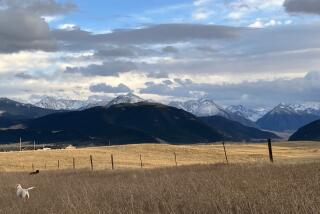Clear view of a dark town
- Share via
With “Eventide,” Kent Haruf returns us to Holt, Colo., the scene of his acclaimed last novel, “Plainsong.” Many of the same characters appear, including Victoria Roubideaux, the pregnant teenager who found refuge with the elderly bachelor McPheron brothers on their ranch 17 miles out of town. In this more loosely plotted sequel, Victoria goes off to college with her baby, and one of the McPherons is killed by an angry bull in his corral.
Holt represents how many, perhaps most, Americans lived a couple of generations ago: in tight little communities close to the land. Now it’s a museum exhibit. Yet because we love museums and cling to whatever is about to disappear, we’re willing to believe that life on the austere, wind-swept High Plains is still somehow more American, more real, than life in the city.
Haruf eases us into this illusion with a prose style, influenced by Cormac McCarthy, that patiently describes the scenery, the weather, the rituals of physical work, the laconic exchanges of everyday conversation while leaving it for us to intuit what characters are thinking and feeling. The closest he comes to interior monologue is a passage like this: Betty Wallace “appeared to be thinking about something that made her sad, something she could never forget in this world, as if she were imprisoned by the thought of whatever that was.” We don’t quite enter this woman’s mind; she remains distanced from us -- and dignified -- by the glass of the display case.
As in “Plainsong,” Haruf sets several stories in motion that intersect because in a small town everybody’s life is everybody else’s business. Raymond McPheron, lonely with his brother and Victoria gone, struggles to maintain his ranch through the winter. Seeking companionship, he starts visiting the tavern in town. Meanwhile, an 11-year-old orphan boy, D.J. Kephart, lives with his grandfather and does chores for a depressed neighbor, Mary Wells, whose husband has lit out for Alaska. D.J. and Mary’s daughter Dena fix up a shed as their clubhouse. Do they bring in old furniture and candles and play video games? Have precocious sex? Not in Holt. They read books.
Betty and her husband, Luther, try feebly to protect their two small children from bullying at school and abuse at home by Betty’s no-good uncle, Hoyt Raines, a regular at the tavern. In critical ways, the Wallaces aren’t part of Holt. A social worker, Rose Tyler, tries to look after them; school officials respond promptly when the children show up in class with welts and bruises. But the Wallaces lack the informal network of friends whose intervention helped Victoria. Nobody is lonelier than an outcast in a small town -- and this applies as well to Hoyt, who suffers almost as much misery as he inflicts.
As the cold months pass, Raymond, who seems younger than he did in “Plainsong,” ventures into territory as treacherous as an ice-slicked two-lane road: For the first time in his life, he starts dating. D.J. faces an uncertain future when Mary rouses herself from her funk, finds a job in a far-off town and prepares to move away with Dena. And the Wallaces may lose their children to the foster-care system out of sheer incompetence.
In “Plainsong,” the heartwarming story of Victoria’s rescue outweighed the examples of small-town cruelty. “Eventide” is a somewhat darker mix, and no single plot line dominates. Still, the pleasures of reading Haruf remain. McCarthy’s under-punctuated sentences lead us from cowboy stoicism into the grotesque, violent and mythic. Haruf is more earthbound; even his saloon brawls stand for nothing beyond themselves. But there’s a decency that shines in the very accuracy with which he describes the ordinary -- the ordinary for Holt, that is, though it has become exotic to the rest of us. Scene after scene, from cattle auction to back-booth seduction to Hoyt’s imprisonment of the Wallaces in their own trailer, flows by us as clear as spring water, proof that truth, like virtue, is its own reward. *
More to Read
Sign up for our Book Club newsletter
Get the latest news, events and more from the Los Angeles Times Book Club, and help us get L.A. reading and talking.
You may occasionally receive promotional content from the Los Angeles Times.








